diabetes support

free shipping over $100 (USA & Canada)
1-877-937-4372 the pet expert hotline

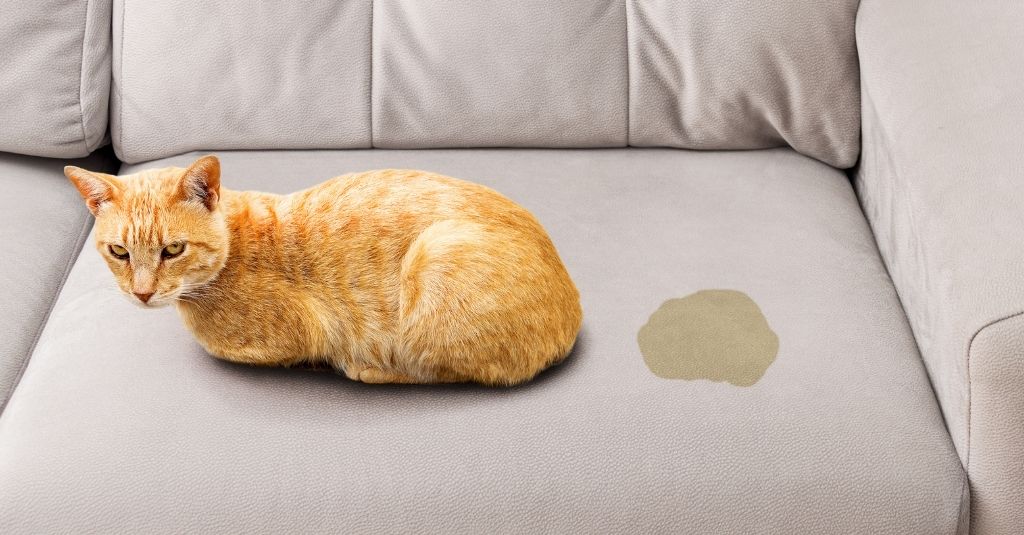
Is your cat peeing outside of the litter box? Before you get upset, it’s important to understand why your cat may be urinating in places they shouldn’t. Unfortunately, many pet parents jump to the conclusion that their cat is misbehaving or is not well trained instead of looking into the underlying cause. In fact, inappropriate urination is a common reason that cats are given up.
When cats have pee accidents outside of the litter box, it means that something is wrong.
Cats never have pee accidents outside of the litter box because they are mean. It means that something is wrong. In most cases, it is because of a medical reason. Therefore, it is important to talk with your vet to check if everything is okay with your little one. However, if any health problem is identified, it may be related to other situations, such as stress, a problem with the litter box, medication, etc.
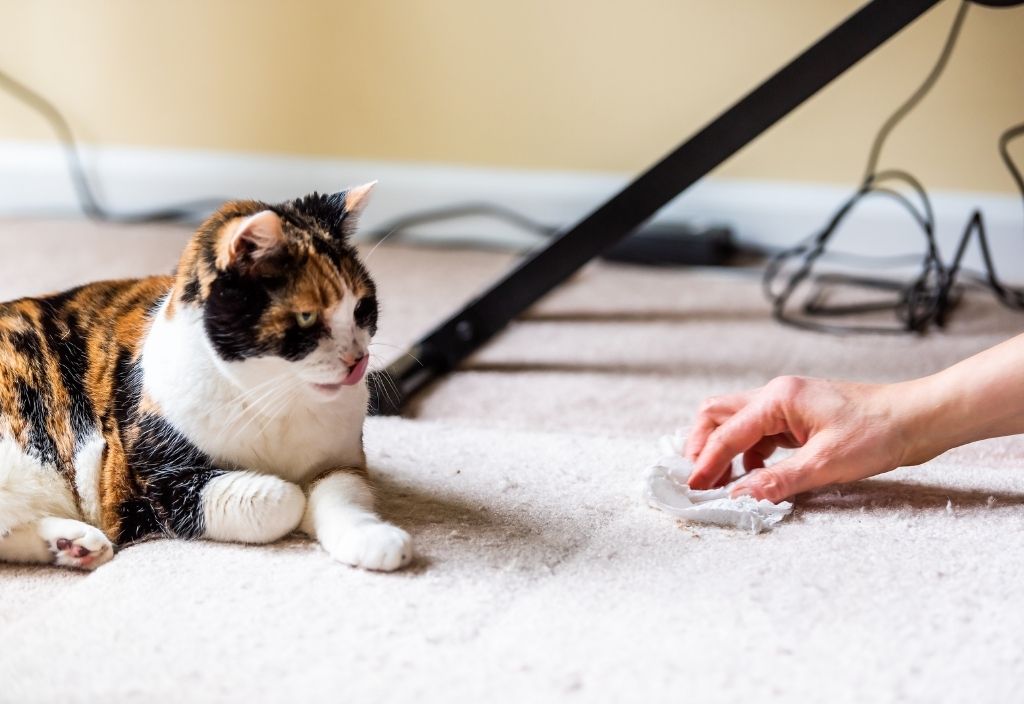
Since there are multiple reasons that a cat may be peeing outside of their litter box, it may take some investigating or trial and error to find the solution.
A very important rule is multiple boxes in multiple places, plenty of room to move, and easy to get into. For kittens less than two months old, small boxes with lower edges are the best. Once they are two or three months old, they become real circus performers and can use bigger boxes. Early positive exposure to various types of boxes and different types of litter is a good idea for them. When we have a kitten with an aversion to the litter that you have at home, if possible, it is worth investigating what kind of litter they used in their previous home, if possible.
Cats want to sniff and investigate, then turn around and dig and cover what they’ve done. This is basic behavior for most cats. Even for a medium-sized kitten, the bigger the box, the better.
Waste must be removed from the boxes at least once per day; and even more often if there is more than one cat in the house.
The rule is to have one more box than the number of cats you have. So, if you have three cats, that means that four boxes are necessary. Keep in mind that cats will see three boxes together in the same room as one giant box. Also, most of them prefer privacy (and who’s to judge them?), therefore, the litter boxes should be in a private place. They should also NOT be close to windows or places that are noisy. If frightened, some cats can instantly have an aversion to the place that the litter box is placed or the litter box itself.
Most cats prefer scent-free litter. However, all cats are individuals and have their own preferences, which can be based on what they are exposed to while they are young.
Some cats prefer covered litter boxes, as they think it offers privacy and a sense of security. However, other cats don’t mind and prefer uncovered boxes.
In multi-cat environments, some supplements such as NHV Matricalm and Lesstress may help reduce anxiety around the litter box.
If the cat jumps into the litter box, does their business, and immediately leaves, they are showing that they tolerate the situation but don’t like the box or it isn’t clean enough.
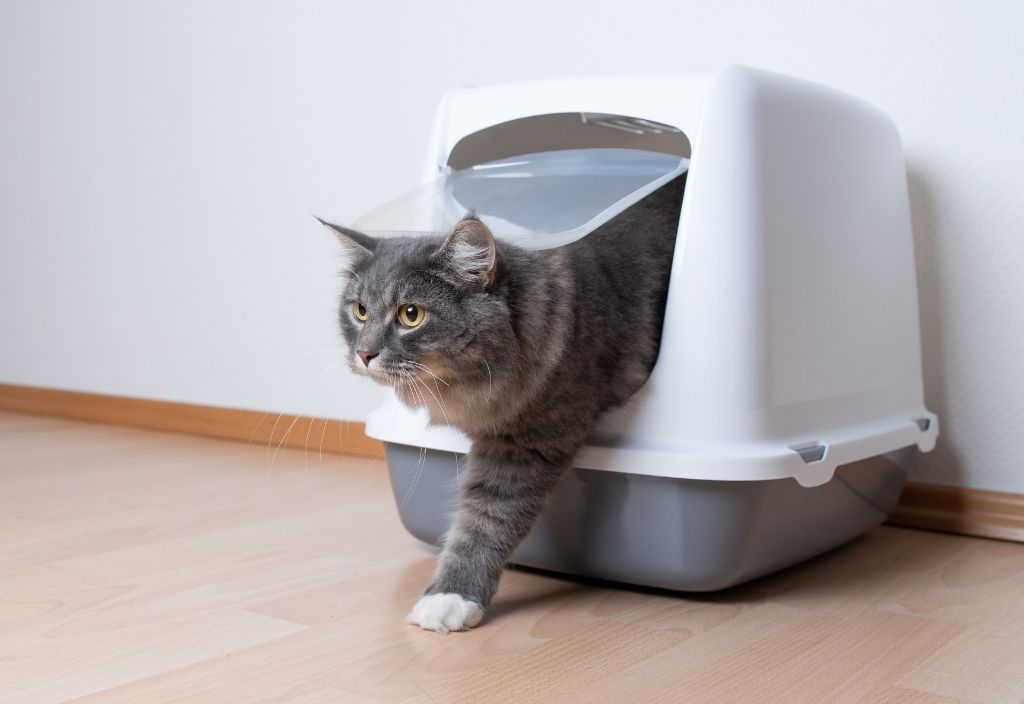
Some illnesses such as diabetes, gastrointestinal problems, and kidney disease can cause your little one to urinate and/or defecate more often. In this case supplements such as Mellit for diabetes, Plantaeris for gastrointestinal problems, and Tripsy for kidneys disease, may be very helpful.
Also, some medications can cause side effects that may affect your little one urinary tract. In this case, Milk Thistle can be useful because it helps protect the liver and kidneys.
It is also important to understand that a cat’s tolerance to a given situation can change over the years. For instance, a cat that was used to use one type of litter box for years can suddenly decide they don’t like using it anymore. Remember, cats are picky animals.
Like us humans, our kitties can also suffer from drastic and sudden changes in their lives. For example, the birth of a baby or the arrival of a new pet in the house, can make our furbabies feel left out and, consequently, having anxiety. The result? Bad behavior, peeing or poop on bed and sofa, loss of appetite, and aggression. To alleviate the pet’s stress, it is necessary to be patient and do everything possible to make your cat feels loved and welcomed. Offer some basic care such as fresh water and toys, and supplements such as Matricalm to help reduce the stress.
If you have any questions about your cat’s inappropriate urination or underlying health conditions, we’re here to help! Click the button below to start chatting with the NHV Pet Experts.
diabetes support

Supports healing of pancreatitis and diabetes mellitus in cats
buy 2 and save $3
3 month supply for a small to medium size pet
A holistic supplement formulated with 9 powerful herbs.


A holistic supplement formulated with 9 powerful herbs.

Diabetes in cats is a common pancreatic disorder that occurs when sugar builds up in the bloodstream instead of entering the tissue to provide energy. If left untreated, your cat can be prone to infections, a slower healing process, and even blindness. Diabetes can also lead to heart, liver or kidney disease.
Some cat breeds are more prone to diabetes, such as the Russian Blue. You can find out if your cat breed is more prone to contract diabetes at NHV breeds and conditions online.
If you have questions about any of our holistic supplements, you can ask an expert at NHV because we want to help your kitty live a longer healthier life naturally.
Read a real pet story of how NHV’s proprietary blend of holistic support helped a cat with diabetes mellitus.
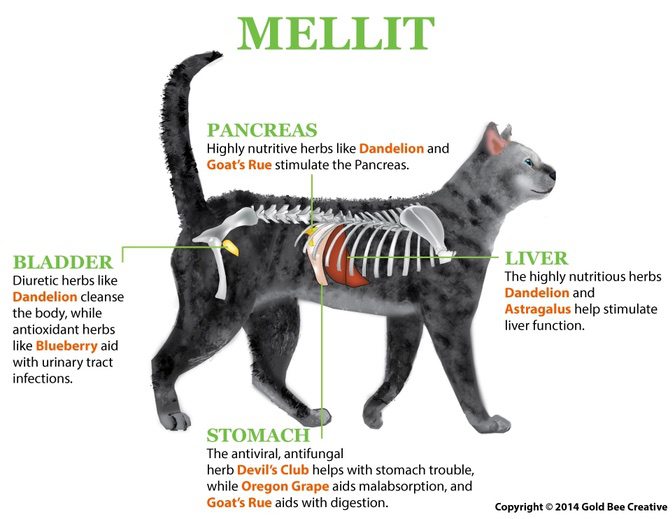
NHV’s Mellit for Cats is an herbal formula explicitly made to support pancreatitis and diabetes mellitus in cats. This potent blend contains nine powerful ingredients designed to help control blood sugar levels and provide cat circulatory support, as well as strengthen and protect other organs that may be affected due to the imbalances triggered in the body.
Select your pet's weight to determine the correct dose.
To be taken twice daily. Determine your pet’s weight and then use the easy chart below to determine the correct dose. This is the minimum dosage.
Pet's Weight Dosage
0 - 15 lb = 0.5 ml
16 - 30 lb = 1.0 ml
31 - 45 lb = 1.5 ml
46 - 60 lb = 2.0 ml
61 - 75 lb = 2.5 ml
Over 75 lb = 3.0 ml
How to Administer
Shake well before use. The easiest method is to use the dropper provide and places the drops into your pet’s food or favorite treat. You can also use the dropper and squirt directly into the pet’s mouth.
Some pets can be finicky, if this occurs consider hiding the drops in foods most pet’s love such as fish, chicken or yogurt or a favourite treat. If your pet only eats dry food then soak a few kibbles at feeding time.
For Best Results
Herbal dietary supplements are beneficial to the health and wellbeing of your pet and are safe for long-term use. Every pet responds to natural herbal supplements differently, therefore it is important to be consistent and administer the product daily. Supplements generally take two to four weeks to take effect, however this will vary from one animal to the next.
Product Storage
All NHV Natural Pet Products are pure herbal extracts and contain no artificial additives, preservatives or coloring. Shelf life after opening is 6 months and must be refrigerated after opening.
Cautions and Contraindications
Do not use Mellit in pregnant or nursing animals. Speak to your vet before using our products. A second visit is recommended if your pet’s condition does not improve, or deteriorates after continued use of the supplements.
All information provided by NHV Natural Pet Products is for educational purposes only.
Diabetes in cats is a common pancreatic disorder that occurs when sugar builds up in the bloodstream instead of entering the tissue to provide energy. If left untreated, your cat can be prone to infections, a slower healing process, and even blindness. Diabetes can also lead to heart, liver or kidney disease.
Some cat breeds are more prone to diabetes, such as the Russian Blue. You can find out if your cat breed is more prone to contract diabetes at NHV breeds and conditions online.
If you have questions about any of our holistic supplements, you can ask an expert at NHV because we want to help your kitty live a longer healthier life naturally.
Read a real pet story of how NHV’s proprietary blend of holistic support helped a cat with diabetes mellitus.

NHV’s Mellit for Cats is an herbal formula explicitly made to support pancreatitis and diabetes mellitus in cats. This potent blend contains nine powerful ingredients designed to help control blood sugar levels and provide cat circulatory support, as well as strengthen and protect other organs that may be affected due to the imbalances triggered in the body.
Select your pet's weight to determine the correct dose.
To be taken twice daily. Determine your pet’s weight and then use the easy chart below to determine the correct dose. This is the minimum dosage.
Pet's Weight Dosage
0 - 15 lb = 0.5 ml
16 - 30 lb = 1.0 ml
31 - 45 lb = 1.5 ml
46 - 60 lb = 2.0 ml
61 - 75 lb = 2.5 ml
Over 75 lb = 3.0 ml
How to Administer
Shake well before use. The easiest method is to use the dropper provide and places the drops into your pet’s food or favorite treat. You can also use the dropper and squirt directly into the pet’s mouth.
Some pets can be finicky, if this occurs consider hiding the drops in foods most pet’s love such as fish, chicken or yogurt or a favourite treat. If your pet only eats dry food then soak a few kibbles at feeding time.
For Best Results
Herbal dietary supplements are beneficial to the health and wellbeing of your pet and are safe for long-term use. Every pet responds to natural herbal supplements differently, therefore it is important to be consistent and administer the product daily. Supplements generally take two to four weeks to take effect, however this will vary from one animal to the next.
Product Storage
All NHV Natural Pet Products are pure herbal extracts and contain no artificial additives, preservatives or coloring. Shelf life after opening is 6 months and must be refrigerated after opening.
Cautions and Contraindications
Do not use Mellit in pregnant or nursing animals. Speak to your vet before using our products. A second visit is recommended if your pet’s condition does not improve, or deteriorates after continued use of the supplements.
All information provided by NHV Natural Pet Products is for educational purposes only.
diarrhea support

Natural relief to help your cat’s diarrhea and inflammatory bowel syndrome (IBS)
buy 2 and save $3
3 month supply for a small to medium size pet
Does your cat have diarrhea or loose stools? NHV Plantaeris is a natural vet-formulated supplement designed to gently help support normal bowel functions, while soothing and relieving spasms of the digestive tract.


Does your cat have diarrhea or loose stools? NHV Plantaeris is a natural vet-formulated supplement designed to gently help support normal bowel functions, while soothing and relieving spasms of the digestive tract.

Plantaeris is a gentle, natural vet-formulated supplement to help cat diarrhea. It is designed to help reduce symptoms of diarrhea and maintain normal bowel function. It also helps soothe and relieve spasms, and discomfort. Since this herbal formulation helps balance the body, it can be used on a longer-term basis if your cat suffers from frequent diarrhea (though it is vital to understand the underlying cause of diarrhea).
Diarrhea is a symptom of digestive disorders. In cats, it can be caused by inflammatory bowel disease, food allergies, parasites, or commonly an underlying condition, such as hyperthyroidism or kidney disease.
To help with cat diarrhea, make sure your pet is getting adequate water and nutrition as diarrhea can lead to weight loss, dehydration, vomiting, and lethargy. Remember that a cat can be eating the same food for years and still develop a food allergy to it. Talk to your vet to rule out any underlying conditions.
For days when your cat is suffering from acute diarrhea, the Plantaeris dosage may be safely doubled. You can then bring down the dosage to normal after the episode has passed. Try adding a bit of pumpkin to their diet to help bulk up stools.
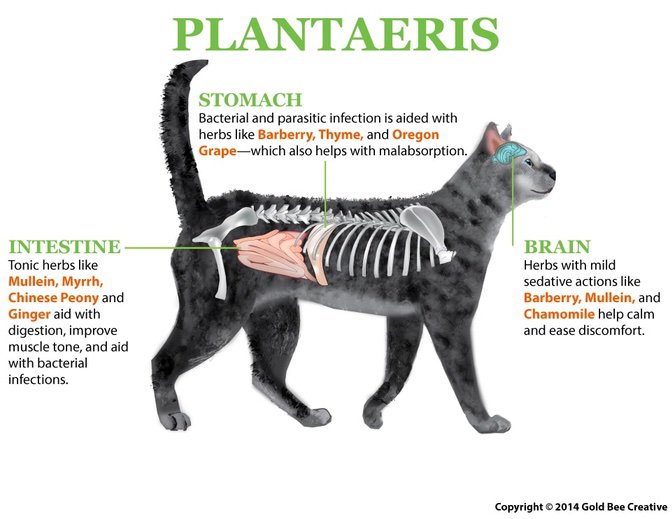
Barberry – Has traditionally been used to treat diarrhea, relieve stomach upset, and to reduce stomach acid.
Mullein – Soothes and lubricates tissues. Mullein’s medicinal properties help fight diarrhea-causing bacteria.
Bayberry – Contains tannins, resins, and gums that control bacterial infection.
Myrrh – Relieves spasms, inflammation, and digestive discomfort.
Thyme – Improves digestion and relaxes spasms. Thyme has traditionally been used to help expel gas, expel worms, and to help with IBD and colitis.
Chamomile – Relaxes the digestive system. It helps expel gas and helps reduce vomiting caused by IBD and is helpful with indigestion.
Chinese Peony – Reduces inflammation and relaxes spasms.
Ginger – Relieves discomfort and stimulates circulation. The enzymes in ginger encourage the production of gastric juices required for digestion. It helps reduce muscle contractions of the bowel, which helps eliminate waste without causing discomfort.
Oregon Grape – Helps relieve indigestion and malabsorption.
Select your pet's weight to determine the correct dose.
To be taken twice daily. Determine your pet’s weight and then use the easy chart below to determine the correct dose. This is the minimum dosage.
Pet's Weight Dosage
0 - 15 lb = 0.5 ml
16 - 30 lb = 1.0 ml
31 - 45 lb = 1.5 ml
46 - 60 lb = 2.0 ml
61 - 75 lb = 2.5 ml
Over 75 lb = 3.0 ml
How to Administer
Shake well before use. The easiest method is to use the dropper provided and place the drops into your pet’s food or favorite treat. You can also use the dropper and squirt directly into the pet’s mouth.
Some pets can be finicky. If this occurs consider hiding the drops in foods most pets love, such as fish, chicken, yogurt or a favorite treat. If your pet only eats dry food then soak a few kibbles at feeding time.
For Best Results
Herbal dietary supplements are beneficial to the health and wellbeing of your pet and are safe for long-term use. Every pet responds to natural herbal supplements differently, therefore it is important to be consistent and administer the product daily. Supplements generally take two to four weeks to take effect; however, this will vary from one animal to the next.
Product Storage
All NHV Natural Pet Products are pure herbal extracts and contain no artificial additives, preservatives or coloring. Shelf life after opening is 6 months and products must be refrigerated after opening.
Cautions and Contraindications
Do not use Plantaeris in pregnant or nursing animals. Speak to your vet before using our products. A second visit is recommended if your pet’s condition does not improve, or deteriorates after continued use of the supplements.
All information provided by NHV Natural Pet Products is for educational purposes only.
Plantaeris is a gentle, natural vet-formulated supplement to help cat diarrhea. It is designed to help reduce symptoms of diarrhea and maintain normal bowel function. It also helps soothe and relieve spasms, and discomfort. Since this herbal formulation helps balance the body, it can be used on a longer-term basis if your cat suffers from frequent diarrhea (though it is vital to understand the underlying cause of diarrhea).
Diarrhea is a symptom of digestive disorders. In cats, it can be caused by inflammatory bowel disease, food allergies, parasites, or commonly an underlying condition, such as hyperthyroidism or kidney disease.
To help with cat diarrhea, make sure your pet is getting adequate water and nutrition as diarrhea can lead to weight loss, dehydration, vomiting, and lethargy. Remember that a cat can be eating the same food for years and still develop a food allergy to it. Talk to your vet to rule out any underlying conditions.
For days when your cat is suffering from acute diarrhea, the Plantaeris dosage may be safely doubled. You can then bring down the dosage to normal after the episode has passed. Try adding a bit of pumpkin to their diet to help bulk up stools.

Barberry – Has traditionally been used to treat diarrhea, relieve stomach upset, and to reduce stomach acid.
Mullein – Soothes and lubricates tissues. Mullein’s medicinal properties help fight diarrhea-causing bacteria.
Bayberry – Contains tannins, resins, and gums that control bacterial infection.
Myrrh – Relieves spasms, inflammation, and digestive discomfort.
Thyme – Improves digestion and relaxes spasms. Thyme has traditionally been used to help expel gas, expel worms, and to help with IBD and colitis.
Chamomile – Relaxes the digestive system. It helps expel gas and helps reduce vomiting caused by IBD and is helpful with indigestion.
Chinese Peony – Reduces inflammation and relaxes spasms.
Ginger – Relieves discomfort and stimulates circulation. The enzymes in ginger encourage the production of gastric juices required for digestion. It helps reduce muscle contractions of the bowel, which helps eliminate waste without causing discomfort.
Oregon Grape – Helps relieve indigestion and malabsorption.
Select your pet's weight to determine the correct dose.
To be taken twice daily. Determine your pet’s weight and then use the easy chart below to determine the correct dose. This is the minimum dosage.
Pet's Weight Dosage
0 - 15 lb = 0.5 ml
16 - 30 lb = 1.0 ml
31 - 45 lb = 1.5 ml
46 - 60 lb = 2.0 ml
61 - 75 lb = 2.5 ml
Over 75 lb = 3.0 ml
How to Administer
Shake well before use. The easiest method is to use the dropper provided and place the drops into your pet’s food or favorite treat. You can also use the dropper and squirt directly into the pet’s mouth.
Some pets can be finicky. If this occurs consider hiding the drops in foods most pets love, such as fish, chicken, yogurt or a favorite treat. If your pet only eats dry food then soak a few kibbles at feeding time.
For Best Results
Herbal dietary supplements are beneficial to the health and wellbeing of your pet and are safe for long-term use. Every pet responds to natural herbal supplements differently, therefore it is important to be consistent and administer the product daily. Supplements generally take two to four weeks to take effect; however, this will vary from one animal to the next.
Product Storage
All NHV Natural Pet Products are pure herbal extracts and contain no artificial additives, preservatives or coloring. Shelf life after opening is 6 months and products must be refrigerated after opening.
Cautions and Contraindications
Do not use Plantaeris in pregnant or nursing animals. Speak to your vet before using our products. A second visit is recommended if your pet’s condition does not improve, or deteriorates after continued use of the supplements.
All information provided by NHV Natural Pet Products is for educational purposes only.
anxiety & aggression support

Natural Help for Stress Reduction, Anxiety Relief, Behavioral Problems, and Aggression in Cats
buy 2 and save $3
3 month supply for a small to medium size pet
Matricalm is an all-natural supplement that provides anxiety and stress relief in cats and promotes calm behavior.

Matricalm is an all-natural supplement that provides anxiety and stress relief in cats and promotes calm behavior.
Help reduce aggressive behavior and provide anxiety and stress relief for your cat with Matricalm, a natural herbal product designed to help reduce excitability in your pet. Cats can become anxious or aggressive when exposed to other animals or to people they are unfamiliar with. When this occurs they may hiss, scratch, howl, or urinate inappropriately.
It’s important to remember that a significant cause of illness in pets results from stress. Helping to keep your cat stress free can help keep them healthier for longer. NHV Pet Experts also often recommend Matricalm for cats dealing with FIV, cancer, kidney issues, hyperthyroidism, and more.
See how NHV Matricalm helped kitty Kimba with yowling and stress.
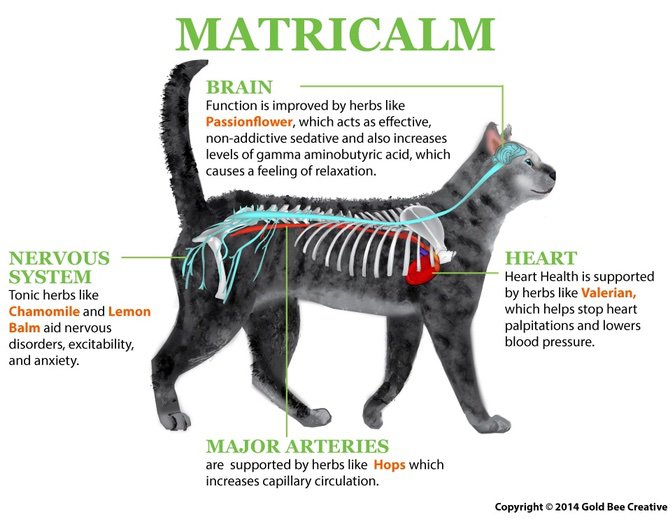
Chamomile – Contains sedative properties. Chamomile also helps the immune system and has a strong affinity for the nervous system.
Passion Flower – An effective, non-addictive sedative. It helps increase gamma-aminobutyric acid (GABA) in the brain, which helps cause a feeling of relaxation. Passion Flower also has strong anti-inflammatory and pain-relieving properties.
Lemon Balm – An aromatic herb used for nervous disorders, excitability, and anxiety. In addition, lemon balm helps lower blood pressure.
Valerian – Helps stop heart palpitations, relaxes spasms, relieves pain, and regulates the nervous system. Valerian also helps improve sleep latency and sleep quality.
Hops – Tension, anxiety, and stress relief in cats. Hops have traditionally been used to help with mood disturbances, such as restlessness and anxiety.
Select your pet's weight to determine the correct dose.
To be taken twice daily. Determine your pet’s weight and then use the easy chart below to determine the correct dose. This is the minimum dosage.
Pet's Weight Dosage
0 - 15 lb = 0.5 ml
16 - 30 lb = 1.0 ml
31 - 45 lb = 1.5 ml
46 - 60 lb = 2.0 ml
61 - 75 lb = 2.5 ml
Over 75 lb = 3.0 ml
How to Administer
Shake well before use. The easiest method is to use the dropper provided and place the drops into your pet’s food or favorite treat. You can also use the dropper and squirt directly into the pet’s mouth.
Some pets can be finicky. If this occurs, consider hiding the drops in foods most pets love, such as fish, chicken, yogurt or a favorite treat. If your pet only eats dry food, then soak a few kibbles at feeding time.
For Best Results
Herbal dietary supplements are beneficial to the health and well-being of your pet and are safe for long-term use. Every pet responds to natural herbal supplements differently. Therefore, it is important to be consistent and administer the product daily. Supplements generally take two to four weeks to take effect; however, this interval will vary from one animal to the next.
Product Storage
All NHV Natural Pet Products are pure herbal extracts and contain no artificial additives, preservatives, or coloring. Shelf life after opening is six months, and it must be refrigerated after opening.
Cautions and Contraindications
Do not use Matricalm for cats as stress relief in pregnant or nursing animals. Speak to your vet before using our products. A second visit is recommended if your pet’s condition does not improve or deteriorates after the continued use of the supplements.
All information provided by NHV Natural Pet Products is for educational purposes only.
Help reduce aggressive behavior and provide anxiety and stress relief for your cat with Matricalm, a natural herbal product designed to help reduce excitability in your pet. Cats can become anxious or aggressive when exposed to other animals or to people they are unfamiliar with. When this occurs they may hiss, scratch, howl, or urinate inappropriately.
It’s important to remember that a significant cause of illness in pets results from stress. Helping to keep your cat stress free can help keep them healthier for longer. NHV Pet Experts also often recommend Matricalm for cats dealing with FIV, cancer, kidney issues, hyperthyroidism, and more.
See how NHV Matricalm helped kitty Kimba with yowling and stress.

Chamomile – Contains sedative properties. Chamomile also helps the immune system and has a strong affinity for the nervous system.
Passion Flower – An effective, non-addictive sedative. It helps increase gamma-aminobutyric acid (GABA) in the brain, which helps cause a feeling of relaxation. Passion Flower also has strong anti-inflammatory and pain-relieving properties.
Lemon Balm – An aromatic herb used for nervous disorders, excitability, and anxiety. In addition, lemon balm helps lower blood pressure.
Valerian – Helps stop heart palpitations, relaxes spasms, relieves pain, and regulates the nervous system. Valerian also helps improve sleep latency and sleep quality.
Hops – Tension, anxiety, and stress relief in cats. Hops have traditionally been used to help with mood disturbances, such as restlessness and anxiety.
Select your pet's weight to determine the correct dose.
To be taken twice daily. Determine your pet’s weight and then use the easy chart below to determine the correct dose. This is the minimum dosage.
Pet's Weight Dosage
0 - 15 lb = 0.5 ml
16 - 30 lb = 1.0 ml
31 - 45 lb = 1.5 ml
46 - 60 lb = 2.0 ml
61 - 75 lb = 2.5 ml
Over 75 lb = 3.0 ml
How to Administer
Shake well before use. The easiest method is to use the dropper provided and place the drops into your pet’s food or favorite treat. You can also use the dropper and squirt directly into the pet’s mouth.
Some pets can be finicky. If this occurs, consider hiding the drops in foods most pets love, such as fish, chicken, yogurt or a favorite treat. If your pet only eats dry food, then soak a few kibbles at feeding time.
For Best Results
Herbal dietary supplements are beneficial to the health and well-being of your pet and are safe for long-term use. Every pet responds to natural herbal supplements differently. Therefore, it is important to be consistent and administer the product daily. Supplements generally take two to four weeks to take effect; however, this interval will vary from one animal to the next.
Product Storage
All NHV Natural Pet Products are pure herbal extracts and contain no artificial additives, preservatives, or coloring. Shelf life after opening is six months, and it must be refrigerated after opening.
Cautions and Contraindications
Do not use Matricalm for cats as stress relief in pregnant or nursing animals. Speak to your vet before using our products. A second visit is recommended if your pet’s condition does not improve or deteriorates after the continued use of the supplements.
All information provided by NHV Natural Pet Products is for educational purposes only.
Published: September 16, 2021